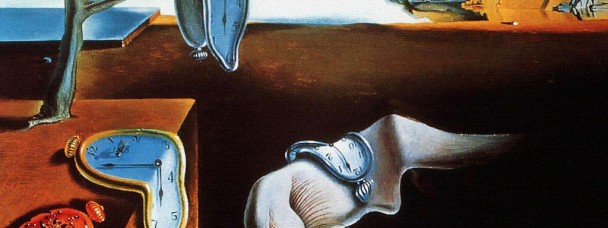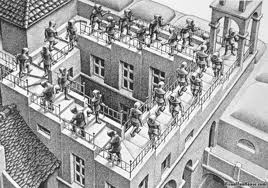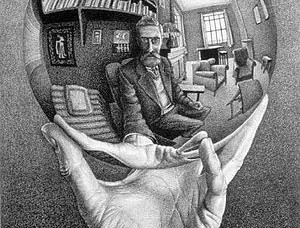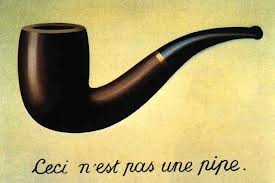Category Archives
Concepts In Motion
Can Karma Dance?
The short answer is, yes it can. However, to understand the motion of karma we have to view it in contrast to its close cousin, Determinism.
The philosophy of Determinism states that everything we do is directly related to our previous actions. In this way all of our actions hang together like unbroken links in a chain. Viewed three dimensionally, the links are influenced by our genetics, environmental factors and our personality makeup. Continue Reading
Dali’s Time
Mick Jagger sang “Time is on my side,” but it didn’t keep him from getting old. The paradox of time is that if we take our eye off it, it flies, yet if we stare at it too long, it crawls. Sometimes we think we have plenty of time, and at other times we wonder where it all went. The paradoxical nature of time is represented by the great Spanish Surrealist, Salvador Dali, in his painting, The Persistence of Memory. Continue Reading
Circles of Confusion
Escher is famous for sketches that warp our perception of space, continuity and progress. The people in Eschers’ sketching, Ascending and Descending, appear to be walking endlessly around a rooftop, going simultaneously up and down the stairs and getting nowhere. It is a sentiment we sometimes share when our drive for personal growth has us going in circles. Continue Reading
The Paradox of the Hag
We’ve all seen the picture of the beautiful young woman that contains the old hag, or perhaps it’s the other way around. I guess it depends on what you’re expecting to see. This perceptual sleight of hand is actually a good illustration of a very common marital dynamic called, “opposition”. Continue Reading
Self-reflection
A defining differentiation between us and all other living things on this planet is our extraordinary ability for self-reflection. This trait allows us to look at ourselves and evaluate our emotional, physical, and metaphysical states. In its less obvious form, self-reflection strengthens our conscience by helping us identify and enforce our own moral awareness. In its more obvious form, it strengthens our ego by helping us define who we are and what we desire. Self-reflection, however, is not infallible. In his drawing, Hand With Reflecting Sphere, M.C. Escher, Continue Reading
We Are Not Our Labels
Labels are useful in the mental health field but we often blur the line between a label and a “condition”. When the lines get blurred we become identified by our label. For some the label is ADHD, for others it’s bi-polar disorder and for the majority of people who experience normal bouts of sadness and pessimism it’s depression. Rene Magritte, the French painter, illustrates the struggle between meaning and language in his painting “This Is Not A Pipe.” Continue Reading






